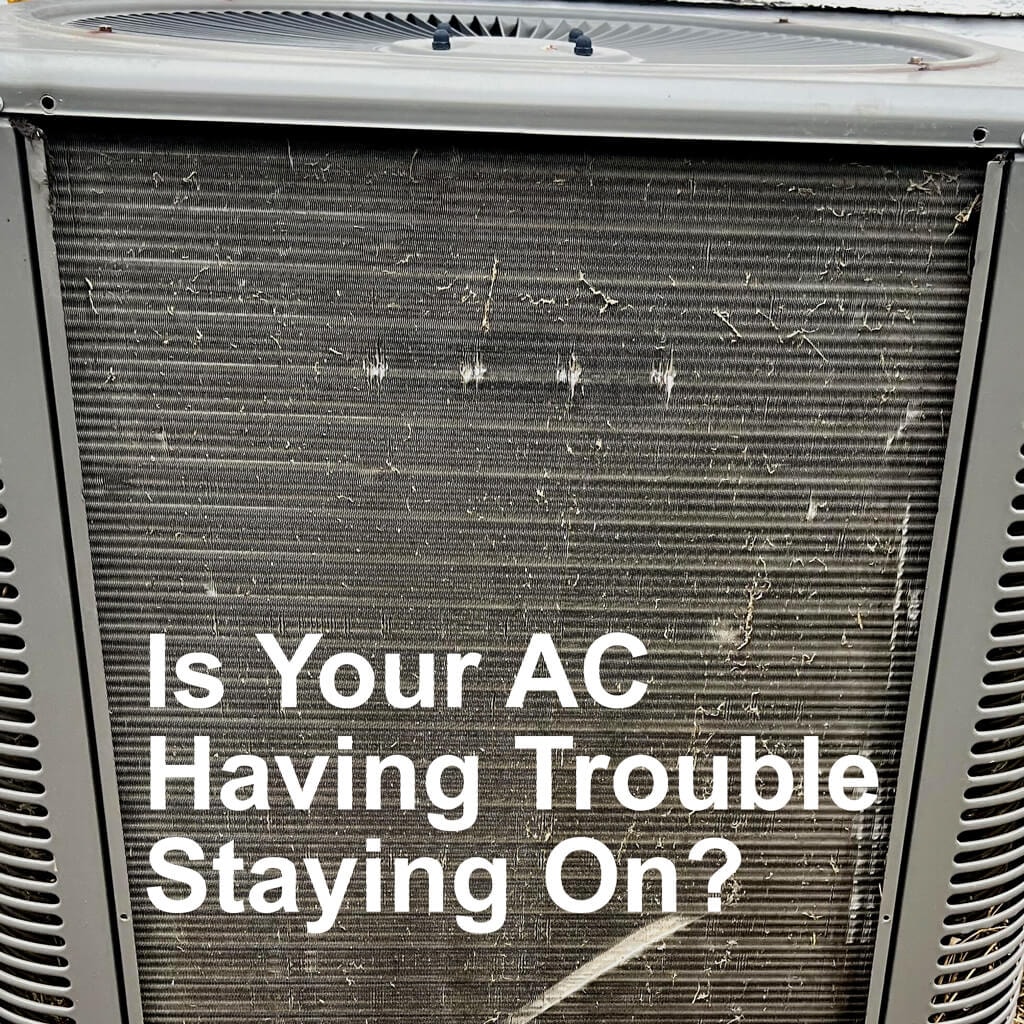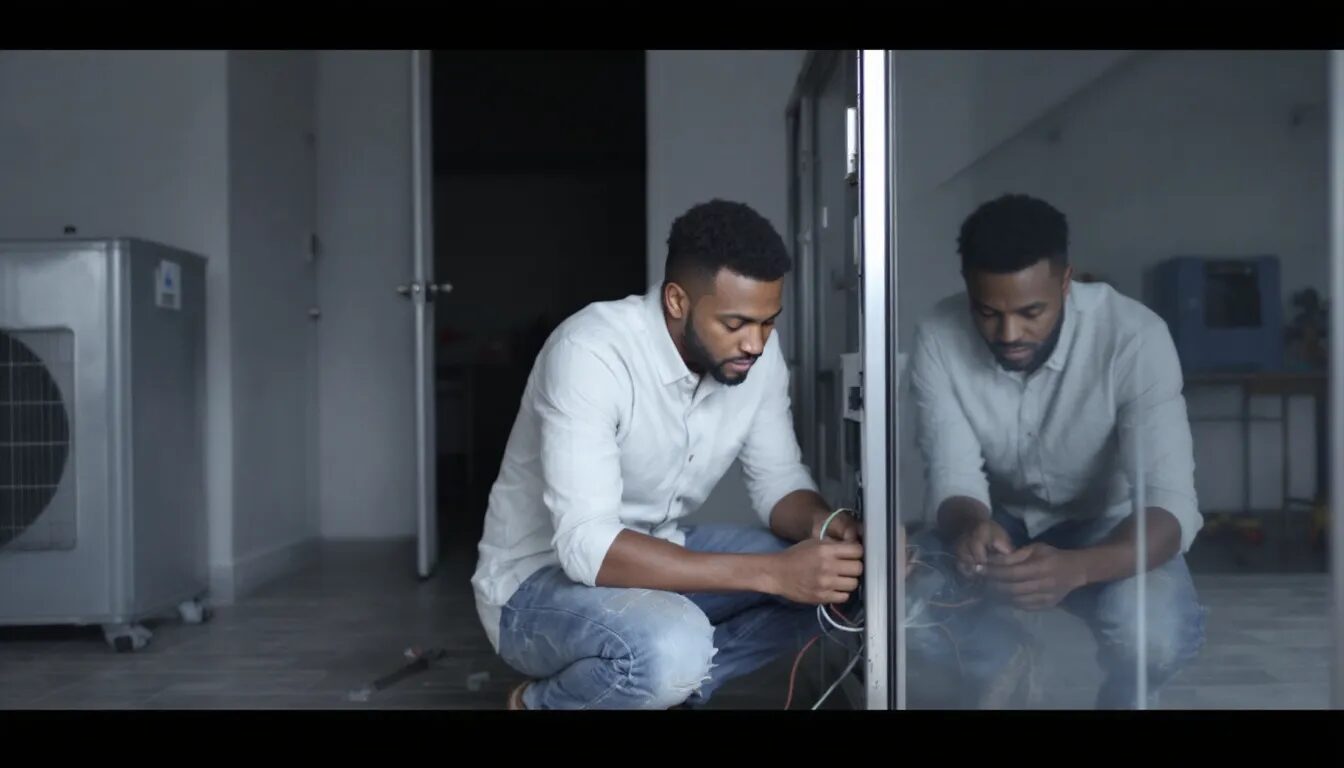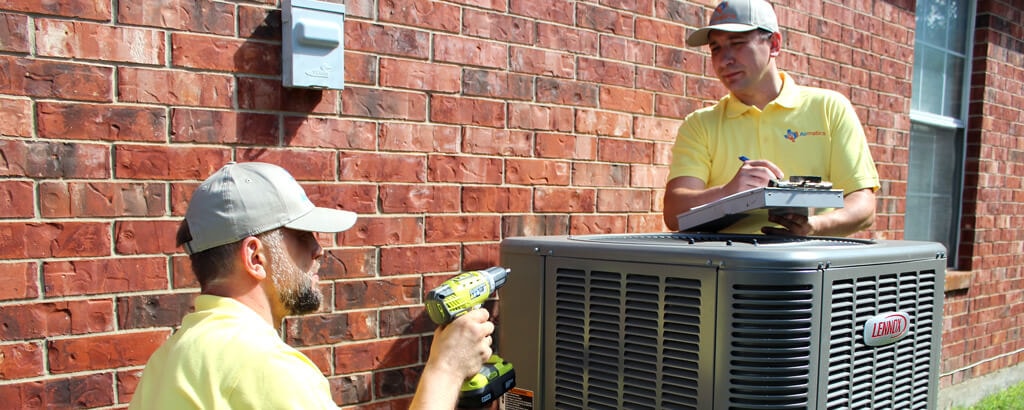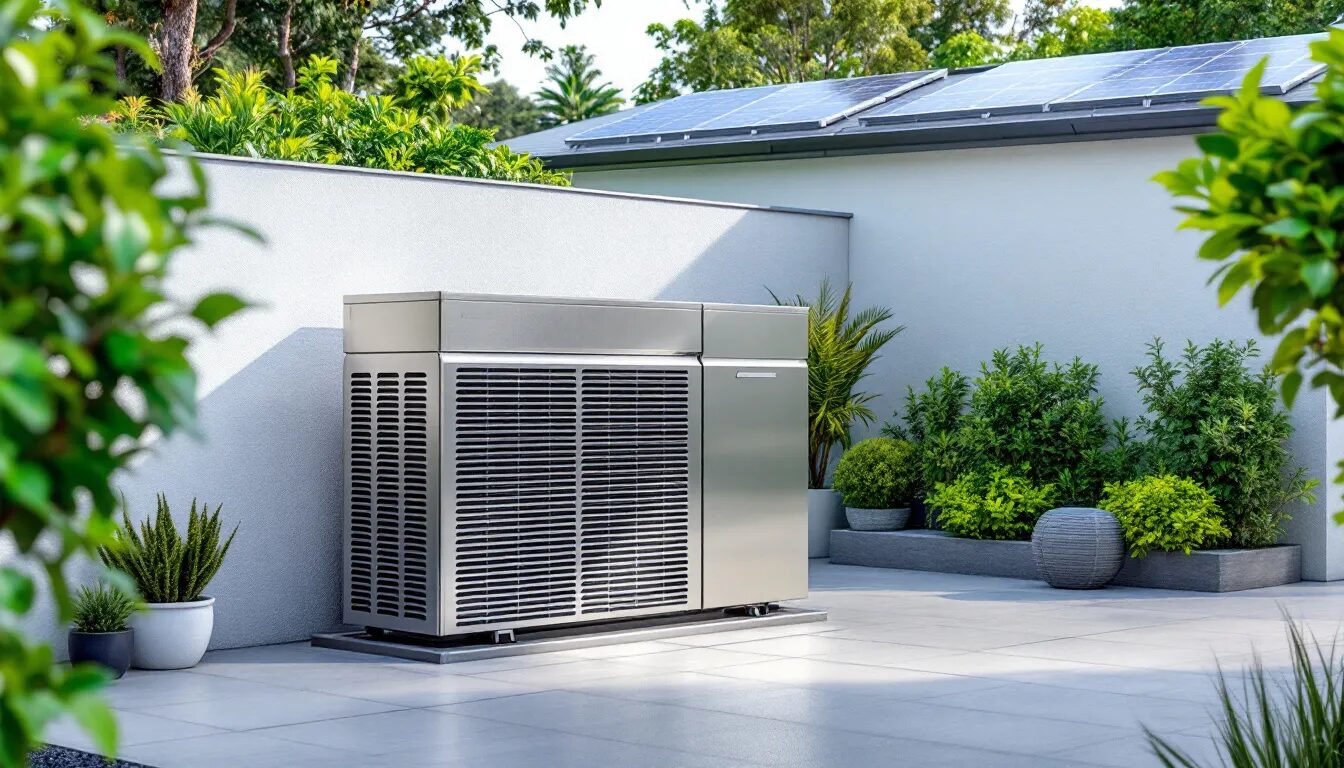Is your AC not staying on? This guide will help you understand why and show you how to fix it.
Key Takeaways
- Common reasons for an AC not staying on include faulty thermostats, dirty air filters, electrical problems, frozen evaporator coils, and incorrect system sizing.
- DIY steps such as checking thermostat settings, cleaning air filters, inspecting electrical connections, and clearing blocked vents can help troubleshoot minor AC issues before seeking professional assistance.
- Professional help is necessary for complex electrical issues, persistent short cycling, and refrigerant leaks to prevent further damage and ensure safety.
Common Causes of AC Not Staying On

When your air conditioner refuses to stay on, it’s usually a sign that something is amiss. The culprits can range from minor issues like a faulty thermostat to more significant problems such as electrical failures or frozen evaporator coils. Understanding these common causes can help you diagnose and potentially fix the issue yourself, saving you an expensive service call.
Among the most common causes for an AC unit shutting down include faulty thermostats, dirty air filters, electrical problems, frozen evaporator coils, and incorrect system size. Let’s delve deeper into each of these issues to provide a clearer picture of what might be going wrong with your air conditioning system.
Faulty Thermostat
A faulty thermostat can wreak havoc on your air conditioning system. When the thermostat malfunctions, it might misread the room’s temperature and send incorrect signals to the AC unit, causing it to short cycle or shut down unexpectedly. Common causes of thermostat malfunction include dead batteries, poor placement near heat sources, and damaged wiring that disrupts communication between the thermostat and the AC unit, including faulty components.
Ensuring your thermostat is set correctly is a simple yet crucial step. Before jumping to conclusions, check the thermostat settings and verify that it is turned on and set to the desired temperature. If you notice that the thermostat is not turned on, check for dead batteries and replace them if necessary to ensure proper heating.
Sometimes, a simple reset can restore proper function and save you from a lot of hassle.
Dirty Air Filters
Dirty air filters are more than just a minor inconvenience; they can cause significant operational issues for your air conditioning unit. When air filters become clogged air filter with dust and debris, they restrict airflow, causing the AC to overheat and shut down as a protective measure. Over time, this can lead to decreased cooling efficiency and increased wear and tear on the system.
Preventing these following issues involves regular cleaning or replacement of air filters. Experts recommend checking your air filters every month and replacing them every three months.
If you notice that your AC unit isn’t turning on, a dirty air filter might be the culprit. Regular maintenance can help ensure your air conditioning system operates efficiently and reliably.
Electrical Problems
Electrical problems can be tricky and dangerous, often requiring professional intervention. Capacitor failure, for example, can cause your AC unit to turn on and off sporadically. Other common electrical issues include stuck relay switches, fused compressor contactors, and wiring problems such as frayed or broken cords. These issues can prevent the air conditioner from receiving the power it needs to operate correctly.
In some cases, power outages or overheating can damage the AC unit’s capacitor, necessitating a reset of the limit switch near the blower fan. Avoid attempting to replace the capacitor yourself due to potential dangers.
Signs of motor issues, such as poor airflow and unusual noises, also indicate that professional replacement might be needed.
Frozen Evaporator Coils
Frozen evaporator coils are a common issue that can lead to your air conditioning system shutting down entirely. When the evaporator coil freezes, it can no longer absorb heat effectively, causing the system to overheat and shut down as a protective measure. This problem often arises due to restricted airflow, dirty coils, or low refrigerant levels.
Regular cleaning of the coils and fins is necessary to maintain efficient cooling performance and prevent freezing. If you notice that your AC unit is not cooling properly or you see ice on the coils, it’s essential to address the cooling process promptly to avoid further damage to the system.
Incorrect System Size
An air conditioning unit that is either too small or too large for the space it is meant to cool can lead to inefficiencies and frequent shutdowns. A unit that is too small will struggle to achieve the desired temperature, causing it to run continuously and wear out faster. Additionally, using ac units that are appropriately sized can improve overall performance, especially when dealing with cold air.
Conversely, an oversized system will short cycle, turning on and off frequently, which can also lead to premature wear and tear on the entire system.
DIY Troubleshooting Steps

Before calling in a professional, there are several DIY troubleshooting steps you can take to diagnose and potentially resolve common AC issues. These steps include checking the thermostat settings, replacing or cleaning air filters, inspecting electrical connections, and clearing blocked vents and registers. Performing these basic checks often allows you to identify and fix minor problems yourself, saving on service costs. Additionally, you may want to consider AC troubleshooting as part of your initial assessment.
Approaching these troubleshooting steps methodically is crucial. Start with the most straightforward checks, such as ensuring the thermostat is set correctly, and then move on to more involved tasks like inspecting electrical connections and clearing obstructions from vents. These troubleshooting tips can help you identify the root cause of the problem and determine whether professional intervention is necessary.
Check Thermostat Settings
One of the first things you should check if your air conditioning unit isn’t staying on is the thermostat settings. Ensure that the thermostat is set to “cool” and that the set temperature is lower than the current room temperature. If the settings are incorrect, turn the thermostat off and then on again to reset it.
Additionally, make sure the fan setting is set to “AUTO” rather than “ON” to ensure the air conditioner runs correctly. Incorrect thermostat settings can prevent the AC from cooling properly, so verifying these settings is a crucial troubleshooting step.
Replace or Clean Air Filters
Clean air filters are crucial for maintaining proper airflow and preventing the AC unit from short cycling. If you find that your air filters are clogged with dust and debris, replace or clean them to restore optimal airflow. Regularly inspecting your air filters can help you catch clogs before they become a significant issue.
Replacing or cleaning air filters is a straightforward task that can significantly improve your air conditioning system’s efficiency and performance. By ensuring your filters are clean, you can prevent overheating and potential shutdowns, keeping your home cool and comfortable.
Inspect Electrical Connections
Inspecting electrical connections is another essential troubleshooting step. Check the circuit breaker and fuse box for any blown fuse or tripped breakers that could cause the ac won’t turn on. If you find a tripped circuit breaker, reset it and see if the AC starts working again.
Additionally, inspect the outdoor AC disconnect switch to ensure it is in the correct position and not damaged. If the pull out head of the AC disconnect is flipped upside down, place it back into the correct position to restore power to the system. These simple checks can help you identify and resolve electrical issues that might be affecting your AC unit.
Clear Blocked Vents and Registers
Blocked vents and registers can significantly reduce the efficiency of your air conditioning system. Ensure that all vents and registers are clear of obstructions such as dust, furniture, or other items that could block air flow. Regularly inspecting your vents and registers can help you maintain optimal airflow and cooling efficiency.
Clearing blocked vents and registers is a simple yet effective way to improve your AC unit’s performance. By ensuring unobstructed airflow, you can help your air conditioning system operate more efficiently and keep your home cool and comfortable.
When to Call a Professional HVAC Technician

While DIY troubleshooting can resolve many common AC issues, there are times when professional intervention is necessary. Complex electrical problems, persistent short cycling, and refrigerant leaks are issues that require the expertise of a licensed HVAC technician. Attempting to fix these problems yourself can lead to further damage and pose safety risks.
Knowing when to call a professional can save you time, money, and potential hazards. If your air conditioning unit is still not functioning after basic troubleshooting steps, it’s time to seek the expertise of a professional HVAC technician. They have the training and experience necessary to safely diagnose and repair complex issues.
Persistent Short Cycling
Persistent short cycling is a strong indicator that professional intervention is necessary. Short cycling, where the AC unit frequently turns on and off, can be caused by various issues, including a faulty thermostat or an improperly sized system.
If resetting the thermostat and performing basic troubleshooting steps do not resolve the issue, it’s time to contact a professional HVAC technician. Continuous short cycling can lead to increased wear and tear on the system, reducing its lifespan and efficiency.
Complex Electrical Issues
Complex electrical issues in an air conditioning system often pose significant risks and complications that can affect the entire system’s functionality. Attempting to diagnose or repair these problems without professional guidance can lead to unsafe conditions or further damage to the system, including air conditioning issues.
Licensed HVAC technicians possess the training and experience necessary to safely identify and resolve major electrical problems in air conditioning systems. If you encounter issues like blown fuses, wiring problems, or tripped circuit breakers that you cannot resolve yourself, it’s best to call a professional.
Refrigerant Leaks
Refrigerant leaks are hazardous and require immediate attention from professionals. Signs of a refrigerant leak include unpleasant odors, reduced cooling efficiency, and visible leaks around the refrigerant lines or condenser unit. Additionally, the use of refrigerants in cooling systems must be managed carefully to prevent such leaks.
If you suspect a refrigerant leak, it is important to take the following steps:
- Turn off the system immediately.
- Contact an HVAC professional right away.
- Understand that refrigerant leaks can compromise the cooling efficiency and safety of an AC system, necessitating specialized repair services.
- Block off the area to ensure safety until help arrives.
Preventative Maintenance Tips

Preventive maintenance ensures your air conditioning system operates efficiently and reliably. Regular maintenance practices, such as cleaning air filters, inspecting electrical connections, and scheduling professional inspections, can help prevent unexpected shutdowns and prolong the lifespan of your AC unit.
By keeping your AC unit in good condition, you can enjoy substantial energy savings and lower energy bills. Consistent upkeep can also improve indoor air quality and maintain comfort levels in your home.
Schedule Regular Inspections
Scheduling regular inspections with a professional HVAC technician is vital for maintaining the efficiency of your AC unit. Annual professional inspections can identify potential AC issues before they become serious, saving you from costly repairs and ensuring your unit runs smoothly throughout the year.
By catching minor issues early, you can prevent them from escalating into major problems. A professional technician can help ensure that professional HVAC technicians are equipped to conduct thorough inspections, checking for blockages, leaks, and other issues, including the drain line, that could affect your AC system’s performance.
Regular inspections are a proactive step towards a reliable and efficient air conditioning system.
Keep Outdoor Unit Clean
Your outdoor condenser unit plays a crucial role in the overall efficiency of your air conditioning system. Keeping this unit clean is essential for maintaining proper airflow and preventing overheating. Debris such as grass clippings, mulch bits, and tall weeds can block the outdoor condenser unit and condenser coils, affecting its operation and leading to potential shutdowns.
Regular cleaning of the outdoor unit involves removing debris and maintaining a clear area around it to ensure proper airflow. This simple maintenance practice can enhance the efficiency of your AC system and prevent future performance issues.
A clean outdoor unit is key to a well-functioning air conditioning system and air conditioners.
Monitor Air Filters
Regularly monitoring and replacing air filters is one of the most effective ways to maintain your HVAC system’s efficiency. Using an air filter monitor can help determine the right time to replace filters, ensuring your system operates at peak performance. These monitors utilize infrared technology to detect when filters become too dirty, allowing for better maintenance planning.
Clean air filters contribute to improved indoor air quality and can reduce energy costs associated with HVAC operations. By staying on top of air filter maintenance, you can prevent common issues like overheating and short cycling, keeping your home comfortable and your air conditioning system running smoothly.
Call Now for HVAC Service! We’ll Restore Your Comfort!
Summary
In conclusion, understanding the common causes of your AC unit not staying on and knowing how to address them can save you from discomfort and costly repairs. From faulty thermostats and dirty air filters to complex electrical problems and frozen evaporator coils, each issue has its own set of solutions. By following the DIY troubleshooting steps and knowing when to call a professional HVAC technician, you can ensure your air conditioning system operates efficiently and reliably.
Regular preventative maintenance, such as scheduling professional inspections, keeping the outdoor unit clean, and monitoring air filters, can prolong the lifespan of your AC unit and improve its performance. Keep a positive attitude, stay relaxed, and enjoy the cozy comfort of your well-maintained air conditioning system!
Frequently Asked Questions
The most common causes of an AC not staying on include faulty thermostats, dirty air filters, electrical issues, frozen evaporator coils, and an incorrectly sized system. Addressing these issues can help maintain consistent cooling performance.
You should replace your air filters every three months to ensure optimal efficiency. Regular replacement helps maintain better air quality and extends the life of your HVAC system.
To address short cycling in your AC, first check the thermostat settings and replace or clean the air filters. If the problem continues, it’s advisable to consult a professional HVAC technician.
Signs of a refrigerant leak include unpleasant odors, reduced cooling efficiency, and visible leaks around the refrigerant lines or condenser unit. Addressing these symptoms promptly can prevent further damage to your cooling system.
To prevent your AC from shutting down unexpectedly, prioritize regular maintenance such as cleaning air filters, checking electrical connections, and scheduling professional inspections. This proactive approach will ensure your system runs efficiently and reduces the risk of sudden failures.